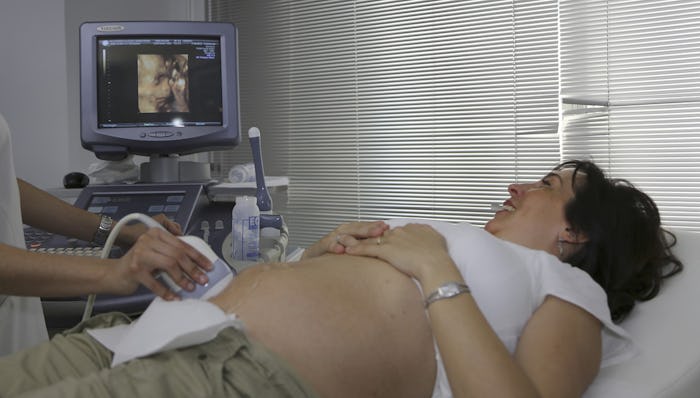Ultrasounds are a staple of modern obstretrics practice, and if you're pregnant, you're probably going to have a number of them. Personally, I found it super reassuring to check in on my baby at key points along the journey. My first ultrasound simply verified my due date, and that I hadn't miscarried or developed an ectopic pregnancy. A second trimester 3-D ultrasound checked for fetal abnormalities, and towards the end of my pregnancy, the ultrasounds confirmed the baby was still growing. Considering the many important uses of this technology during pregnancy, it's fair to wonder, how accurate are ultrasounds?
Michael Rothman, MD, a neuroradiologist practicing in Maryland, explains to Romper that an ultrasound works much like sonar, with energy applied to the body by a microphone — called a transducer — creating an acoustic echo. "High-speed computers can reconstruct the internal structure of the target based on the speed and strength of this returned noise," he explains. In essence, sound paints a picture of your baby, with a little help from digital technology and real-time measurements. Unfortunately, ultrasound technology, like most technologies, isn't perfect, especially when it comes second and third trimester dating and measurements.
In terms of dating, the ultrasound's accuracy depends on the trimester, explains Kara Manglani, CNM, a nurse-midwife practicing in New York City and blogging at The Fertile Times. She tells Romper that a first-trimester ultrasound can date a pregnancy within three to five days. By the second, accuracy drops to within "about a week." By the time your third trimester comes around, ultrasounds can't be counted on to provide you with an accurate or useful due date at all. They can be two or even three weeks off, and, as any pregnant woman knows, three weeks is huge.
One way in which an ultrasound is very accurate is in determining the presence of a heart beat. If you see a heart beat flickering, you can certainly feel reassured. "While these scans are very accurate, this does not guarantee the future viability of the pregnancy," notes Manglani. According to American Pregnancy Association, a first trimester ultrasound can also determine if you have an ectopic or molar pregnancy, and if you have more than one baby on the way.
Around week 20, an ultrasound might be used to detect fetal abnormalities. "The accuracy of these ultrasounds depends on the skill of the technician and radiologist, the maternal habitus, and the position of the baby," explains Manglani. "Occasionally, the baby may be in a position that makes it difficult to identify certain anatomical landmarks. In this case, the tech may attempt to get the baby to move, or will schedule you for a repeat ultrasound." You can also discover your baby's sex around week 20 (or a few weeks earlier). Importantly, as American Pregnancy Association reported, you won't be 100 percent sure of your baby's sex until his or her birthday, especially if like to play hide-and-seek when you go in for a scan.
If you have any kind of problem — you've gone past your due date, the baby's not moving much, or something just doesn't feel right — an ultrasound can tell you how things are going and even alert your doctor to a potential emergency. "[A fetal well-being assessment] ultrasound looks for fetal movements, growth of the baby, position of the placenta, and the amount of amniotic fluid." An ultrasound can also act as a guide for your doctor during an amniocentesis, and can very accurately tell you if your baby is breech in the final weeks.
The bottom line is that ultrasounds are quite accurate, especially in the early days. As the pregnancy progresses, establishing a due date and accurate fetal weights and measurements becomes more challenging, because when it comes to measurements, an ultrasound's range of error increases every week. That said, ultrasounds still have a lot going for them, especially when it comes to detecting fetal anomalies, and monitoring your baby's wellbeing in the late stages of pregnancy.
Check out Romper's new video series, Romper's Doula Diaries:
Check out the entire Romper's Doula Diaries series and other videos on Facebook and the Bustle app across Apple TV, Roku, and Amazon Fire TV.
